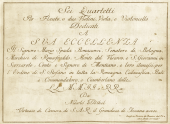French flautist and composer. He came in Florence with his father Nicolas who was first oboist with the grand duke’s guard from 1739. The younger Nicolas also joined the bande in 1736 before being promoted to flautist in the grand duke’s (Ferdinando III) chapel and chamber music. From 1739 he also worked in Lucca playing during the Santa Croce’s festivity and the opera season.. He played in the Teatro della Pergola’s orchestra (Florence) taking part in over 50 operas between 1765 and 1798. Dôthel had a very good relationship with Charles Antoine Campion who was Maestro of grand duke’s Chapel from 1763: the two same-aged musicians were born in the same country. They were both mentioned (together with Nardini) by Charles Burney and described as outstanding musicians. The flautist Ribock in the German review Magazin der Musik (1783), described so Dôthel’s musical style: ""angenehme gefaellige Melodie untermischt sich und in ihren Theilen zusammengehaengt, oft ungeheuer lange aber unterbrochene Passagien; con amore gebrauchte Triolen; gaenzlicher Mangel an Zunge, oder liebe Unstatthaftigkeit derselben; dagegen vieler Gebrauch der Brust und eines tiefen Hauches; und endlich eine gewisse Art Tempo Rubato, die den Wert der Noten umkehrt, und einen großen Theil der Eigenthuemlichkeit der Manier ausmacht"".
Dôthel composed a great deal of flute music: Prince von Esterhazy’s catalogue lists 95 pieces, including concertos, sonatas, duets and trios. Though notices about Dôthel’s activity outside Italy don’t exist, abroad he was really well-known. In fact, all his works, excepting the Sei quartetti per flauto o due violini, viola e violoncello printed in Florence by Raniero del Vivo, were edited in Paris, London and Amsterdam. An accurate listing of Dôthel’s output is severely impeded by the fact that James Oswald used the pseudonym ‘Dottel Figlio’ for some of his works published in London at the time.
Instrumental music
Concerto n. 7 in Do Magg. per flauto e orchestra










